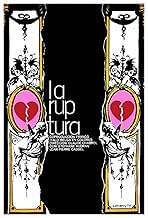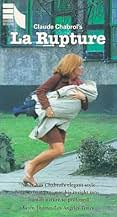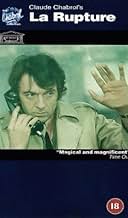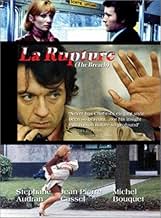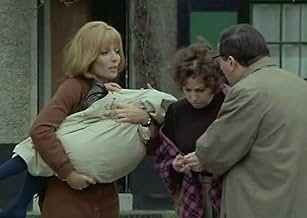VALUTAZIONE IMDb
7,2/10
2046
LA TUA VALUTAZIONE
Un padre ferisce suo figlio. Va a vivere con genitori che incolpano la madre del bambino. Assumono qualcuno per trovare informazioni su di lei per un'imminente udienza per la custodia.Un padre ferisce suo figlio. Va a vivere con genitori che incolpano la madre del bambino. Assumono qualcuno per trovare informazioni su di lei per un'imminente udienza per la custodia.Un padre ferisce suo figlio. Va a vivere con genitori che incolpano la madre del bambino. Assumono qualcuno per trovare informazioni su di lei per un'imminente udienza per la custodia.
- Regia
- Sceneggiatura
- Star
- Premi
- 1 candidatura in totale
Margo Lion
- Mme Humbert - la première parque
- (as Margot Lion)
Recensioni in evidenza
The Breach (aka La rupture) is a film made by celebrated French director Claude Chabrol in the middle of his golden period at the turn of the 70's. Like most of his other films from this time, it is a psychological thriller that is more interested in character interactions than in suspense. While it is true that there is some of that present here too, there isn't a lot and the film only truly moves into thriller territory in its final quarter. In fact, the switch is quite jarring and has left some thinking it doesn't fit very well alongside what has gone before. I kind of liked the ending though, it isn't especially realistic and even becomes a bit surreal, yet the story on the whole has got an oddness about it generally, typified by the unsettling and somewhat off-centre musical score used throughout. The story revolves around a woman called Hélène who is the wife of a rich layabout drug addict. One day he attacks her and their child, leaving the boy hospitalised. Hélène attacks him back leaving him with a head injury. His rich father hires a sleazy friend of the family to befriend Hélène with the objective of incriminating her, leading to a divorce that would favour his son.
Like a lot of Chabrol's best works this one stars his wife, the radiant Stéphane Audran who is, once more, extremely good and sympathetic as Hélène, Jean-Pierre Cassel is also impressive as her manipulative 'friend', while it would be remiss not to mention Catherine Rouvel also, who is a lot of fun as his highly sexed girlfriend who pleasingly spends most of the film in a state of undress (ooh la la). In fact, there is a plethora of oddball side characters in this one, most live in the boarding house where the majority of the action revolves around, such as three old ladies who continually play with Tarot cards, a mentally-backwards girl and an overly-dramatic actor. On top of this, it's nicely photographed, especially in the surreal park scene towards the end where things get a little trippy. The film criticises the bourgeois, with the rich grandparents acting like it is their right to dictate events purely on account of their financial strength. But the film works mainly as an off-kilter psychological drama/thriller, underpinned by fine acting and some good direction.
Like a lot of Chabrol's best works this one stars his wife, the radiant Stéphane Audran who is, once more, extremely good and sympathetic as Hélène, Jean-Pierre Cassel is also impressive as her manipulative 'friend', while it would be remiss not to mention Catherine Rouvel also, who is a lot of fun as his highly sexed girlfriend who pleasingly spends most of the film in a state of undress (ooh la la). In fact, there is a plethora of oddball side characters in this one, most live in the boarding house where the majority of the action revolves around, such as three old ladies who continually play with Tarot cards, a mentally-backwards girl and an overly-dramatic actor. On top of this, it's nicely photographed, especially in the surreal park scene towards the end where things get a little trippy. The film criticises the bourgeois, with the rich grandparents acting like it is their right to dictate events purely on account of their financial strength. But the film works mainly as an off-kilter psychological drama/thriller, underpinned by fine acting and some good direction.
The alternative English-language title of this one, THE BREAK UP, always seemed to me to imply that Chabrol had made a typically classy treatment of the theme of a family going through divorce proceedings a full decade before that Oscar-laden triumph KRAMER VS. KRAMER (1979). However, the film's very opening sequence obliterates that misconception immediately and completely: the quiet breakfast being enjoyed by a mother (the ubiquitous Stephane Audran playing, as usual, a character named Helene) and her little son is suddenly shattered by the unkempt and sinister appearance of the father (Jean-Claude Drouot – perhaps best-known for playing Yul Brynner's long-haired right-hand man in THE LIGHT AT THE EDGE OF THE WORLD the following year) who is clearly in some kind of daze brought on by the use of illegal substances.
The couple start arguing and, just as the man seems about to slap the woman, he grabs the kid and literally throws him clear across the room; the latter hits his head violently against the edge of a kitchen cupboard and lands in a bloody puddle on the floor! It is a thoroughly shocking sequence – not just because it is totally unexpected and comes so early in the film but also since this utterly vile act is committed by a father upon his own son! Previously, I had equally gasped at a similar deed featuring in Ingmar Bergman's influential period piece THE VIRGIN SPRING (1960) but, again, the blood link between abuser and abused here makes the action all the more reprehensible.
Actually, the film's original French title, LA RUPTURE, should from the outset have been more suggestive to what was in store for the perceptive viewer and, indeed, can be interpreted to allude to various characters and events: the dissolution of the couple's socially incompatible marriage; the gash in the kid's head (he is confined to a hospital bed for the duration of the film and is never again seen in a conscious state); the wrecking of the illusory brashness with which down-on-his-luck mole (Jean-Pierre Cassel, effectively cast against type) callously spins a web of deceit around Audran in a frame-up engineered by her all-powerful father-in-law (Michel Bouquet, also uncharacteristically portraying a villain) to ensure the custody of his grandson; and, at the film's conclusion, the cracking of Audran's very sanity – not only through the incredible events happening around her, but also because of her unwittingly imbibing a drug-spiked orange juice drink concocted by Cassel!!
And what about the breach in Chabrol's own stylistic approach to such archetypal material, taking in as it does a healthy dose of black comedy (the eccentric inhabitants at the foreclosing boarding house where Audran and Cassel install themselves – including three elderly tarot-playing snoops, delusional thespian Mario David, boozing landlord Jean Carmet and his bespectacled, "backward" daughter Katia Romanoff), sleazy bedroom antics (courtesy of Cassel's perennially nude and horny girl played by the delectable Catherine Rouvel) and even outright psychedelia (Audran's kaleidoscopic vision of friendly balloon vendor Dominique Zardi)! Evidently, Chabrol wears his well-documented Fritz Lang influence on his sleeve even in this case! For the record, the film under review is based on a novel by Charlotte Armstrong, of whose works Chabrol would later also adapt MERCI POUR LE CHOCOLAT (2000).
The first-rate ensemble cast also boasts a handful of other notable names: Michel Duchassoy (star of that which is arguably Chabrol's finest achievement, 1969's THIS MAN MUST DIE – appearing here as Audran's sympathetic lawyer), Angelo Infanti (as the doctor treating Audran's son and a lodger in her peculiar dwelling) and even Belgian director extraordinaire Harry Kumel (who, I am ashamed to say, I did not recognize even though I know how he looks today from recent photographs and past DVD supplements!). As always with Chabrol during this major phase in his career, the impeccable accomplishments of cinematographer Jean Rabier and composer Pierre Jansen (who contributes a strikingly unsettling score) can never be underestimated.
Incidentally, Audran and Cassel would later appear as an oversexed married couple in Luis Bunuel's THE DISCREET CHARM OF THE BOURGEOISIE (1972) and, again, in Chabrol's star-studded THE TWIST (1976) which, ironically, is reputed to be his nadir(!) – and, of course, Audran and Bouquet also played husband and wife in Chabrol's THE UNFAITHFUL WIFE (1969; which, like THE BREACH itself, can be counted among Chabrol's Top 5 movies) and JUST BEFORE NIGHTFALL (1971); besides, probably as a result of this same Franco-Italo-Belgian co-production, Bouquet and Cassel would themselves be subsequently engaged to participate in Harry Kumel's own exhilarating magnum opus, MALPERTUIS (1971).
The couple start arguing and, just as the man seems about to slap the woman, he grabs the kid and literally throws him clear across the room; the latter hits his head violently against the edge of a kitchen cupboard and lands in a bloody puddle on the floor! It is a thoroughly shocking sequence – not just because it is totally unexpected and comes so early in the film but also since this utterly vile act is committed by a father upon his own son! Previously, I had equally gasped at a similar deed featuring in Ingmar Bergman's influential period piece THE VIRGIN SPRING (1960) but, again, the blood link between abuser and abused here makes the action all the more reprehensible.
Actually, the film's original French title, LA RUPTURE, should from the outset have been more suggestive to what was in store for the perceptive viewer and, indeed, can be interpreted to allude to various characters and events: the dissolution of the couple's socially incompatible marriage; the gash in the kid's head (he is confined to a hospital bed for the duration of the film and is never again seen in a conscious state); the wrecking of the illusory brashness with which down-on-his-luck mole (Jean-Pierre Cassel, effectively cast against type) callously spins a web of deceit around Audran in a frame-up engineered by her all-powerful father-in-law (Michel Bouquet, also uncharacteristically portraying a villain) to ensure the custody of his grandson; and, at the film's conclusion, the cracking of Audran's very sanity – not only through the incredible events happening around her, but also because of her unwittingly imbibing a drug-spiked orange juice drink concocted by Cassel!!
And what about the breach in Chabrol's own stylistic approach to such archetypal material, taking in as it does a healthy dose of black comedy (the eccentric inhabitants at the foreclosing boarding house where Audran and Cassel install themselves – including three elderly tarot-playing snoops, delusional thespian Mario David, boozing landlord Jean Carmet and his bespectacled, "backward" daughter Katia Romanoff), sleazy bedroom antics (courtesy of Cassel's perennially nude and horny girl played by the delectable Catherine Rouvel) and even outright psychedelia (Audran's kaleidoscopic vision of friendly balloon vendor Dominique Zardi)! Evidently, Chabrol wears his well-documented Fritz Lang influence on his sleeve even in this case! For the record, the film under review is based on a novel by Charlotte Armstrong, of whose works Chabrol would later also adapt MERCI POUR LE CHOCOLAT (2000).
The first-rate ensemble cast also boasts a handful of other notable names: Michel Duchassoy (star of that which is arguably Chabrol's finest achievement, 1969's THIS MAN MUST DIE – appearing here as Audran's sympathetic lawyer), Angelo Infanti (as the doctor treating Audran's son and a lodger in her peculiar dwelling) and even Belgian director extraordinaire Harry Kumel (who, I am ashamed to say, I did not recognize even though I know how he looks today from recent photographs and past DVD supplements!). As always with Chabrol during this major phase in his career, the impeccable accomplishments of cinematographer Jean Rabier and composer Pierre Jansen (who contributes a strikingly unsettling score) can never be underestimated.
Incidentally, Audran and Cassel would later appear as an oversexed married couple in Luis Bunuel's THE DISCREET CHARM OF THE BOURGEOISIE (1972) and, again, in Chabrol's star-studded THE TWIST (1976) which, ironically, is reputed to be his nadir(!) – and, of course, Audran and Bouquet also played husband and wife in Chabrol's THE UNFAITHFUL WIFE (1969; which, like THE BREACH itself, can be counted among Chabrol's Top 5 movies) and JUST BEFORE NIGHTFALL (1971); besides, probably as a result of this same Franco-Italo-Belgian co-production, Bouquet and Cassel would themselves be subsequently engaged to participate in Harry Kumel's own exhilarating magnum opus, MALPERTUIS (1971).
Of all the great films that Claude Chabrol made; The Breach is one of the most often praised, and that is not surprising at all as this film sees the great French director at the absolute top of his game and deserves every good word said about it! As ever with Chabrol, what we have here is a film that thrills on the surface but has much more going on beneath it. The characters are undoubtedly the most important thing about the film; and the director ensures that each one is brought to life effectively and believably, and this ensures that the film's many substantial points can come through. The film begins with a surreal sequence that could be something out of a zombie movie, as we see a dishevelled man emerge from the bathroom in just a robe and proceed to attack his wife Hélène. His attention soon moves on to the small boy and after putting the kid in hospital, the wife decides to file for a divorce. However, things are not so simple as her husband's father happens to be one of the richest and most powerful men in town, so he won't let Hélène take his grandson from him without a fight...and hires the immoral Paul Thomas to dig up some dirt on Hélène.
The film doesn't contain a great deal of excitement in the common thriller sense, but Chabrol keeps his audience on the edge of their seats by way of the characters and the atmosphere. The film centres on a boarding house and the people that live there; and the interaction between them makes up the bulk of the film. The main theme on display is an attack against the rich; this comes through plainly and obviously through the character of Ludovic Régnier; a man who has enough money to always get what he wants and not care about who gets trampled in the process. The outlook of the film is very bleak all round and Chabrol seems keen to show the dark side of human nature as much as possible. The central plot line, which involves a man trying to prove that an upstanding woman is an unfit mother by any means necessary, is very bleak in the way it plays out. As ever with Chabrol, the acting is excellent and he has put together a great cast here that includes his then wife and frequent muse, the beautiful Stéphane Audran in the lead role and a support cast that features superb performances from the likes of Jean-Pierre Cassel and Michel Bouquet. The film has a very unique style that fluctuates throughout; as mentioned, the first five minutes or so almost seem like something out a zombie movie and then it moves into more familiar Chabrol territory before changing again for the climax as the director gives us a very strange and striking hallucination sequence. Overall, this is an excellent thriller that comes highly recommended and I may even rate it as Chabrol's best.
The film doesn't contain a great deal of excitement in the common thriller sense, but Chabrol keeps his audience on the edge of their seats by way of the characters and the atmosphere. The film centres on a boarding house and the people that live there; and the interaction between them makes up the bulk of the film. The main theme on display is an attack against the rich; this comes through plainly and obviously through the character of Ludovic Régnier; a man who has enough money to always get what he wants and not care about who gets trampled in the process. The outlook of the film is very bleak all round and Chabrol seems keen to show the dark side of human nature as much as possible. The central plot line, which involves a man trying to prove that an upstanding woman is an unfit mother by any means necessary, is very bleak in the way it plays out. As ever with Chabrol, the acting is excellent and he has put together a great cast here that includes his then wife and frequent muse, the beautiful Stéphane Audran in the lead role and a support cast that features superb performances from the likes of Jean-Pierre Cassel and Michel Bouquet. The film has a very unique style that fluctuates throughout; as mentioned, the first five minutes or so almost seem like something out a zombie movie and then it moves into more familiar Chabrol territory before changing again for the climax as the director gives us a very strange and striking hallucination sequence. Overall, this is an excellent thriller that comes highly recommended and I may even rate it as Chabrol's best.
LA RUPTURE is one of Claude Chabrol's most devastating critiques of the bourgeoisie and it's one of his finest films. It's about a working wife and mother fighting for custody of her small son after the boy's drug-addicted father has attacked them, only to find her husband's rich parents have hired a sleazy, corrupt investigator to destroy her reputation. The film isn't flawless; there are too many extraneous and eccentric characters but the main plot is beautifully handled, (it's based on a novel by Charlotte Armstrong), and Stephane Audran as the wife and Jean-Pierre Cassel as the investigator are both terrific. Of course, you may think Chabrol's decision to treat such a serious subject as domestic violence purely as a thriller a little tasteless but fundamentally this isn't really a film about domestic violence at all but an almost Dickensian study of evil; the bourgeoisie parents are distinctly rotten, the investigator even more so. If the film were more 'realistic' it might be unbearable; there's a scene of potential child sex abuse, and the child is mentally handicapped, that is almost too bizarre to be really disturbing and the film gets very bizarre towards the end. However, even with its convoluted plot it works superbly both as an outright thriller and as a scathing indictment of a highly amoral society.
Like Graham Greene's so-called entertainments, this film veers into melodrama, but it never seemed unreal to me and was certainly a pleasure to watch. The highlight for me was the machinations of the lowlife hired to bring the heroine down. I also got drawn into the setting of the rooming house and the warmth of the more innocent people that give strength to the heroine. Acting, as always in a Chabrol film, is superb.
Lo sapevi?
- QuizClaude Chabrol once stated that the bus scene where Hélène (his wife Stéphane Audran) tells her family's story to the lawyer (Michel Duchaussoy) was the occasion when he finally thought that Stéphane had become an actress.
- Citazioni
Opening Title Card: [from the French] But what thick night suddenly surrounds me? JEAN RACINE
- ConnessioniReferences I due invincibili (1969)
I più visti
Accedi per valutare e creare un elenco di titoli salvati per ottenere consigli personalizzati
- How long is The Breach?Powered by Alexa
Dettagli
- Tempo di esecuzione2 ore 4 minuti
- Mix di suoni
- Proporzioni
- 1.85 : 1
Contribuisci a questa pagina
Suggerisci una modifica o aggiungi i contenuti mancanti

Divario superiore
By what name was All'ombra del delitto (1970) officially released in India in English?
Rispondi
